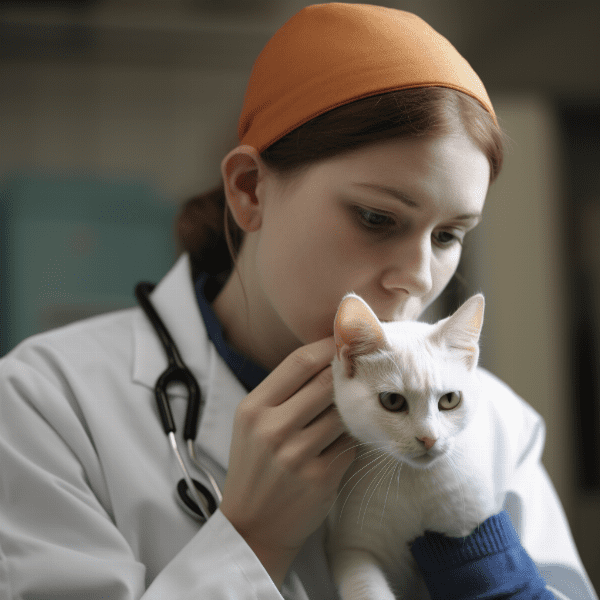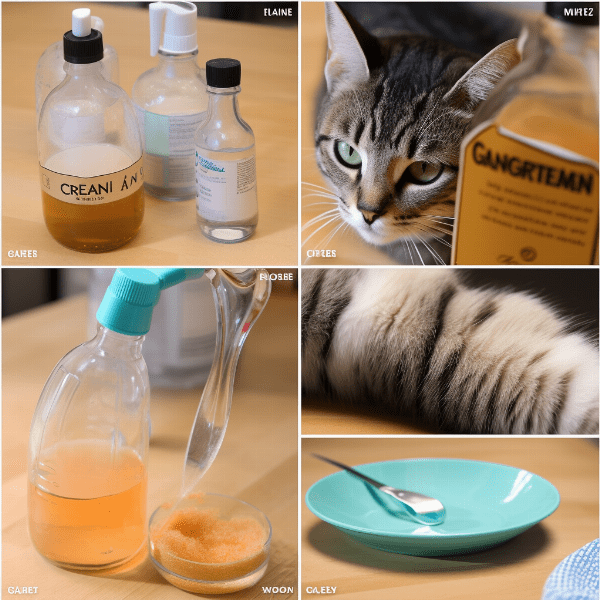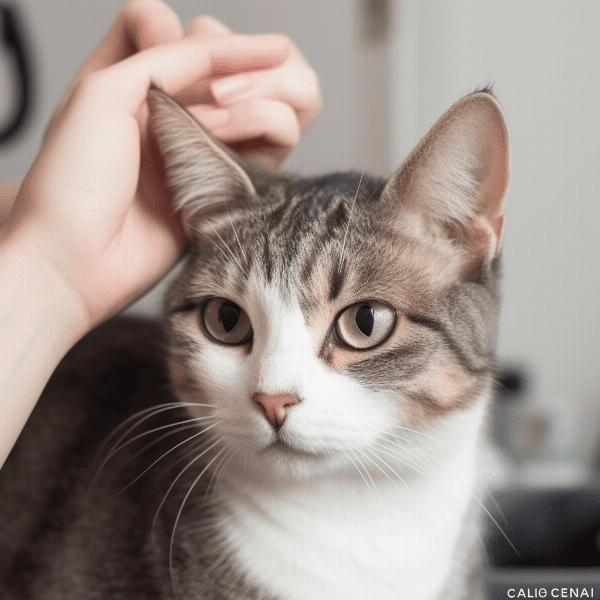Table of Contents
- Why Cleaning Kittens’ Ears Is Important
- Understanding the Anatomy of a Kitten’s Ear
- Signs of Ear Problems in Kittens
- Supplies You Need for Cleaning Your Kitten’s Ears
- Step-by-Step Guide to Cleaning Your Kitten’s Ears
- Precautions to Take When Cleaning Your Kitten’s Ears
- How Often Should You Clean Your Kitten’s Ears?
- When to See a Vet for Ear Problems in Kittens
Why Cleaning Kittens’ Ears Is Important
Ear cleaning is an important aspect of maintaining your kitten’s overall health and wellbeing. Just like humans, cats produce ear wax, which can accumulate and cause problems if left unattended. Here are some reasons why cleaning your kitten’s ears is essential:
Preventing Ear Infections
Ear infections are common in kittens and can be caused by a variety of factors, including ear mites, allergies, and bacteria. By cleaning your kitten’s ears regularly, you can help prevent the buildup of debris and wax that can contribute to these infections. Regular cleaning also helps to detect any issues early, allowing for prompt treatment and better outcomes.
Promoting Good Hearing
A kitten’s sense of hearing is essential to their survival, allowing them to detect potential threats and navigate their environment. When ear wax builds up in their ears, it can muffle sounds and reduce their ability to hear properly. By cleaning their ears regularly, you can help ensure that their hearing is not compromised.
Bonding with Your Kitten
Regular grooming and cleaning sessions can be an excellent way to bond with your kitten. By handling them and cleaning their ears in a gentle and caring manner, you can help them feel more comfortable and secure in their relationship with you. This can be especially important if you have recently adopted a kitten or are trying to establish trust.
Overall Hygiene
Just like any other part of your kitten’s body, their ears require regular cleaning to maintain good hygiene. Failure to clean their ears can result in the buildup of wax, dirt, and debris, which can cause a foul odor and attract pests like ear mites.
In conclusion, cleaning your kitten’s ears is a crucial aspect of their overall health and wellbeing. By preventing infections, promoting good hearing, bonding with your kitten, and maintaining their hygiene, you can help ensure that they are happy, healthy, and thriving.
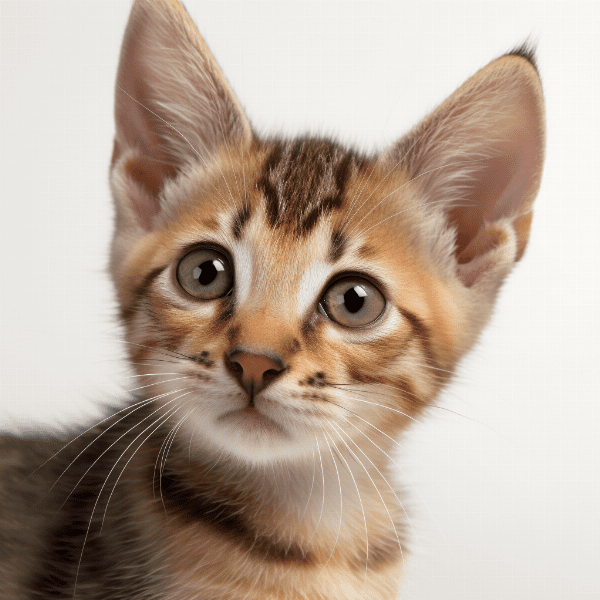
Understanding the Anatomy of a Kitten’s Ear
To properly clean your kitten’s ears, it’s important to understand the anatomy of their ears. A kitten’s ear has three parts: the outer ear, middle ear, and inner ear.
The Outer Ear
The outer ear is the part of the ear that you can see. It’s composed of the ear flap, also known as the pinna, and the ear canal. The pinna is made of cartilage and covered in skin and fur. The ear canal is a tube-like structure that leads to the eardrum.
The Middle Ear
The middle ear is located between the eardrum and the inner ear. It contains three tiny bones called the malleus, incus, and stapes, which are responsible for transmitting sound vibrations from the eardrum to the inner ear.
The Inner Ear
The inner ear is the most delicate and complex part of the ear. It’s responsible for converting sound waves into electrical signals that are sent to the brain. The inner ear also plays a crucial role in balance and spatial orientation.
How the Ear Works
When sound waves enter the ear canal, they travel down to the eardrum, causing it to vibrate. The vibrations are then transmitted to the middle ear bones and eventually to the inner ear, where they are converted into electrical signals that are sent to the brain.
Understanding the anatomy of your kitten’s ear is essential for proper ear cleaning. The outer ear is the part that you will be cleaning, while the middle and inner ear are delicate and require special attention from a veterinarian. By knowing the different parts of the ear, you can ensure that you clean your kitten’s ears safely and effectively.

Signs of Ear Problems in Kittens
Ear problems in kittens can be caused by a variety of factors, including allergies, ear mites, infections, and injuries. It’s important to be aware of the signs of ear problems in kittens so that you can seek treatment promptly. Here are some common signs of ear problems in kittens:
Scratching or Head Shaking
Kittens with ear problems may scratch at their ears or shake their heads frequently. This is often a sign of irritation or discomfort in the ear.
Discharge or Odor
Ear problems in kittens can cause discharge or a foul odor to emanate from their ears. This can be a sign of infection or inflammation in the ear.
Redness or Swelling
If your kitten’s ear appears red, swollen, or inflamed, it could be a sign of an ear infection or injury.
Changes in Behavior
Ear problems can cause changes in a kitten’s behavior, such as increased aggression, lethargy, or loss of appetite. If you notice any sudden changes in your kitten’s behavior, it’s essential to seek veterinary care.
Loss of Balance
The inner ear plays a crucial role in a kitten’s sense of balance. If your kitten is experiencing ear problems, they may have difficulty maintaining their balance, stumble, or fall.
If you notice any of these signs of ear problems in your kitten, it’s essential to seek veterinary care as soon as possible. Early treatment can help prevent more severe complications and ensure that your kitten is on the path to recovery.
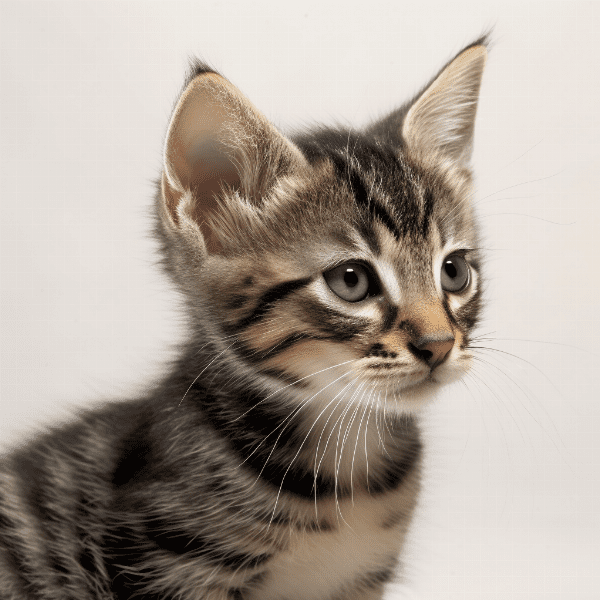
Supplies You Need for Cleaning Your Kitten’s Ears
To clean your kitten’s ears properly, you will need a few supplies. Here are the essential items you will need:
Ear Cleaning Solution
An ear cleaning solution is a specially formulated liquid that helps to dissolve wax and debris in your kitten’s ears. You can purchase an ear cleaning solution from your veterinarian or a pet store. It’s important to use a solution that is designed specifically for cats, as human ear cleaning solutions can be too harsh for their delicate ears.
Cotton Balls or Pads
Cotton balls or pads are used to apply the ear cleaning solution to your kitten’s ears and to remove any debris or wax. It’s important to use a new cotton ball or pad for each ear to prevent the spread of infection.
Towel
A towel can be used to wrap your kitten securely and protect them from any spills or messes during the ear cleaning process.
Treats
Treats are an essential part of the ear cleaning process, as they help to distract and reward your kitten for good behavior. You can offer your kitten a treat before, during, and after the ear cleaning process to help keep them calm and happy.
It’s important to have all of these supplies on hand before you begin cleaning your kitten’s ears. This will help ensure that the process goes smoothly and that your kitten remains comfortable throughout. If you’re unsure about which products to use or how to use them, consult with your veterinarian for guidance.
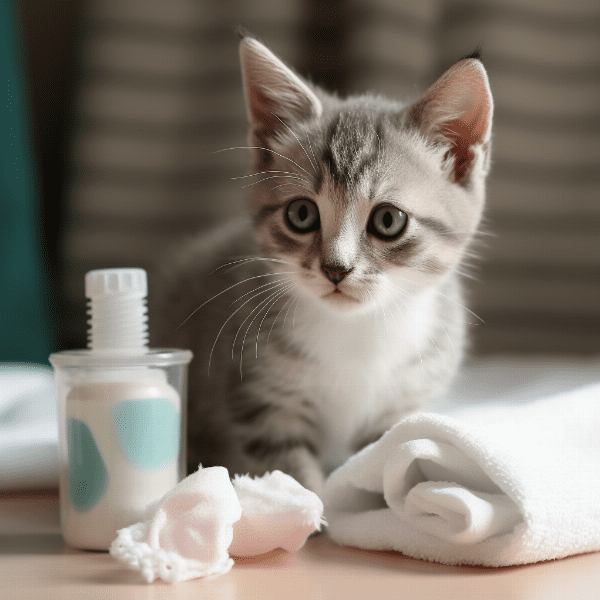
Step-by-Step Guide to Cleaning Your Kitten’s Ears
Cleaning your kitten’s ears can be a straightforward process when done correctly. Here is a step-by-step guide to help you clean your kitten’s ears safely and effectively:
Step 1: Prepare Your Supplies
Gather all the supplies you’ll need for cleaning your kitten’s ears, including an ear cleaning solution, cotton balls or pads, a towel, and treats.
Step 2: Secure Your Kitten
Wrap your kitten securely in a towel, leaving only their head exposed. This will prevent them from squirming or scratching during the ear cleaning process.
Step 3: Apply the Ear Cleaning Solution
Gently squirt a small amount of the ear cleaning solution into your kitten’s ear canal. Be sure to follow the instructions on the bottle carefully and only use the recommended amount.
Step 4: Massage the Ear
Gently massage the base of your kitten’s ear for about 30 seconds. This will help to distribute the cleaning solution throughout their ear and loosen any wax or debris.
Step 5: Remove Debris
Use a cotton ball or pad to wipe away any debris or wax from your kitten’s ear. Be gentle and do not insert the cotton ball or pad too deeply into their ear canal, as this can cause damage.
Step 6: Repeat for Other Ear
Repeat steps 3-5 for your kitten’s other ear.
Step 7: Reward Your Kitten
Offer your kitten a treat and plenty of praise to reward them for good behavior during the ear cleaning process.
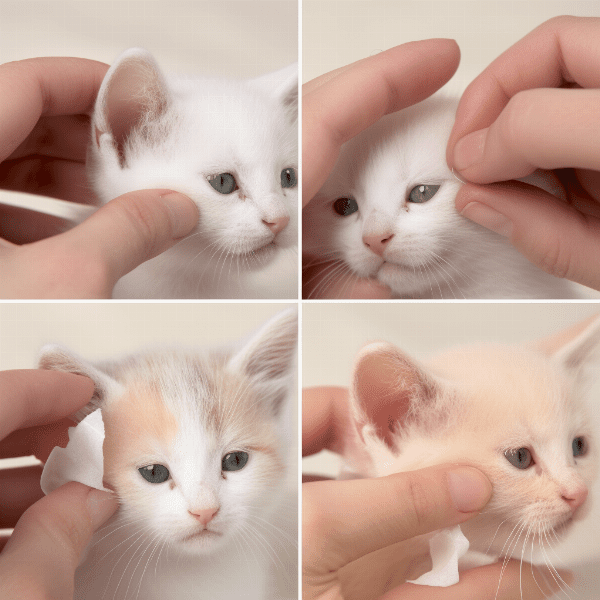
Precautions to Take When Cleaning Your Kitten’s Ears
Cleaning your kitten’s ears can be a safe and effective way to maintain their ear health, but there are some precautions you should take to ensure their safety. Here are some precautions to keep in mind when cleaning your kitten’s ears:
Avoid Using Q-tips
Never use Q-tips or other cotton swabs to clean your kitten’s ears, as they can push debris deeper into their ear canal and cause damage.
Use the Right Products
Use only ear cleaning solutions that are specifically designed for cats. Using human ear cleaning solutions or other products can cause irritation, inflammation, or other adverse reactions.
Don’t Overdo It
Avoid over-cleaning your kitten’s ears, as this can cause dryness and irritation. As a general rule, aim to clean their ears once a month, or more often if recommended by your veterinarian.
Be Gentle
Always be gentle when cleaning your kitten’s ears, as their ears are delicate and sensitive. Use a soft touch and avoid inserting anything too deeply into their ear canal.
Watch for Signs of Discomfort
If your kitten shows signs of discomfort or pain during the ear cleaning process, stop immediately and consult with your veterinarian. These signs can include vocalization, scratching, or excessive head shaking.
Seek Veterinary Care for Persistent Problems
If your kitten’s ear problems persist despite regular cleaning or if you notice any unusual symptoms, such as bleeding, discharge, or swelling, seek veterinary care immediately.
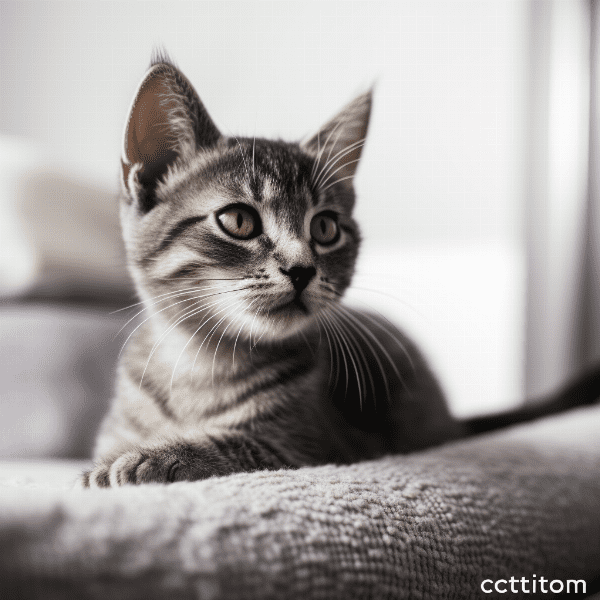
How Often Should You Clean Your Kitten’s Ears?
Cleaning your kitten’s ears is an essential part of their overall health and wellbeing, but it’s essential to do it in moderation. Over-cleaning can lead to dryness, irritation, and other issues, while under-cleaning can lead to ear infections and other complications. Here are some guidelines to help you determine how often you should clean your kitten’s ears:
Check Their Ears Regularly
Regularly checking your kitten’s ears can help you detect any signs of ear problems early, before they become more severe. Look for any discharge, foul odor, redness, swelling, or other signs of irritation or infection.
Follow Your Veterinarian’s Recommendations
Your veterinarian can help you determine how often you should clean your kitten’s ears based on their individual health needs. They may recommend cleaning their ears more frequently if they are prone to ear infections or have allergies.
Aim for Once a Month
As a general rule, aim to clean your kitten’s ears once a month, especially if they are not showing any signs of ear problems. This can help prevent the buildup of wax and debris that can contribute to infections or other issues.
Adjust as Needed
If you notice any signs of ear problems, such as discharge or odor, you may need to clean your kitten’s ears more often. Conversely, if you notice that their ears are dry or irritated, you may need to clean them less frequently.
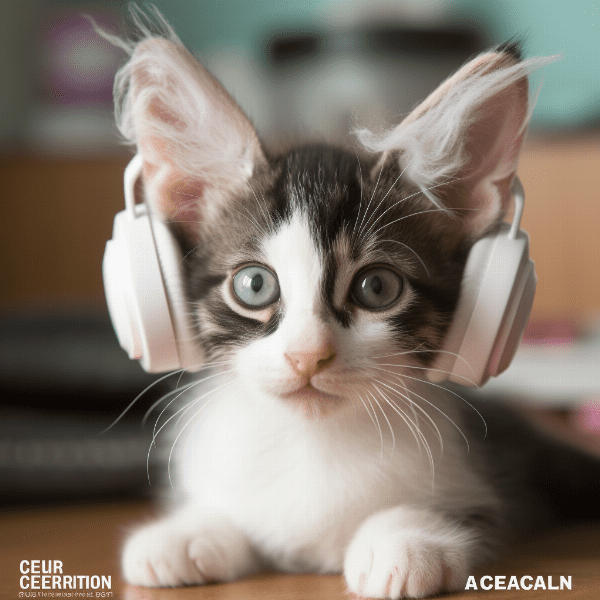
When to See a Vet for Ear Problems in Kittens
While regular ear cleaning can help prevent ear problems in kittens, there may be times when you need to seek veterinary care. Here are some situations when you should consider taking your kitten to the vet for ear problems:
Persistent Symptoms
If your kitten’s ear problems persist despite regular cleaning or show no signs of improvement, it’s time to consult with your veterinarian. Persistent symptoms can include discharge, foul odor, redness, swelling, or unusual behavior.
Unusual Symptoms
If your kitten displays unusual symptoms, such as bleeding, excessive scratching, or head shaking, it’s important to seek veterinary care immediately. These symptoms can be a sign of a more serious underlying condition, such as an ear infection or injury.
History of Ear Problems
If your kitten has a history of ear problems or is prone to ear infections, it’s important to consult with your veterinarian regularly. They can recommend a personalized ear cleaning and care regimen to help prevent future problems.
Inability to Clean Ears
If your kitten is resistant to ear cleaning or you are unable to clean their ears safely and effectively, it’s important to seek veterinary care. They can provide guidance on proper cleaning techniques or perform the cleaning procedure themselves.
By keeping an eye out for these signs and symptoms and seeking veterinary care when necessary, you can help ensure that your kitten’s ear problems are addressed promptly and effectively. Remember to always consult with your veterinarian if you have any concerns or questions about your kitten’s ear health.
